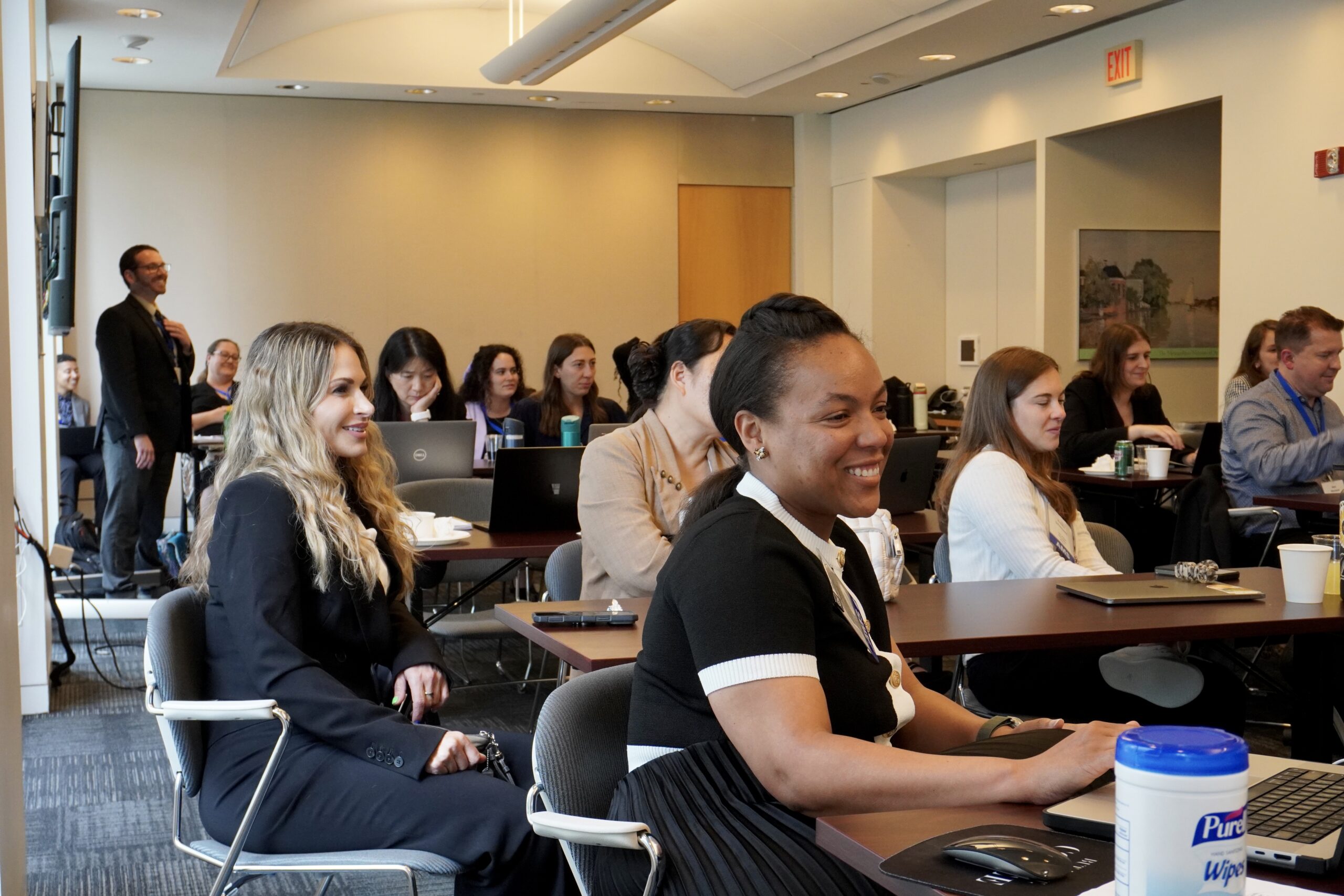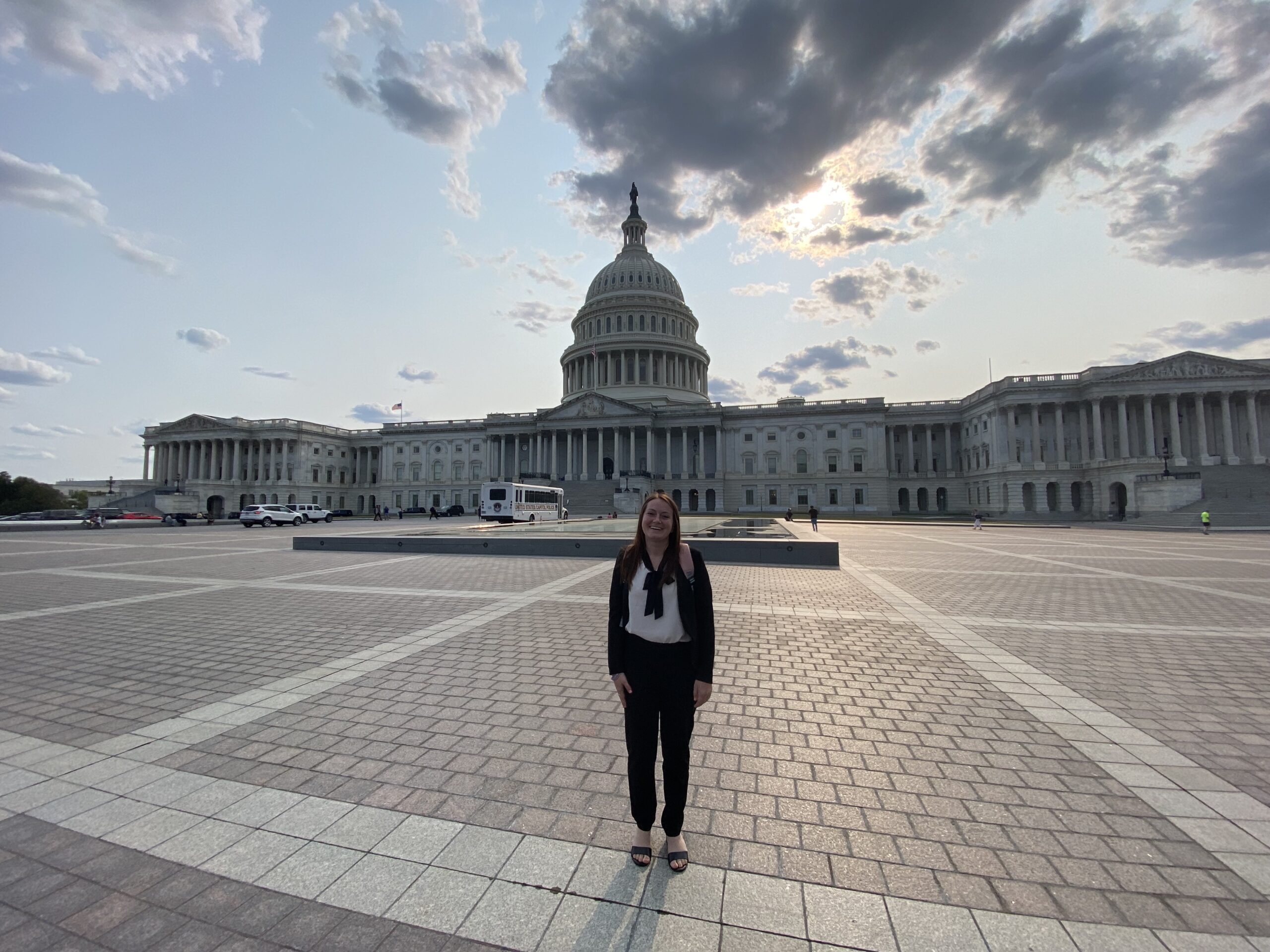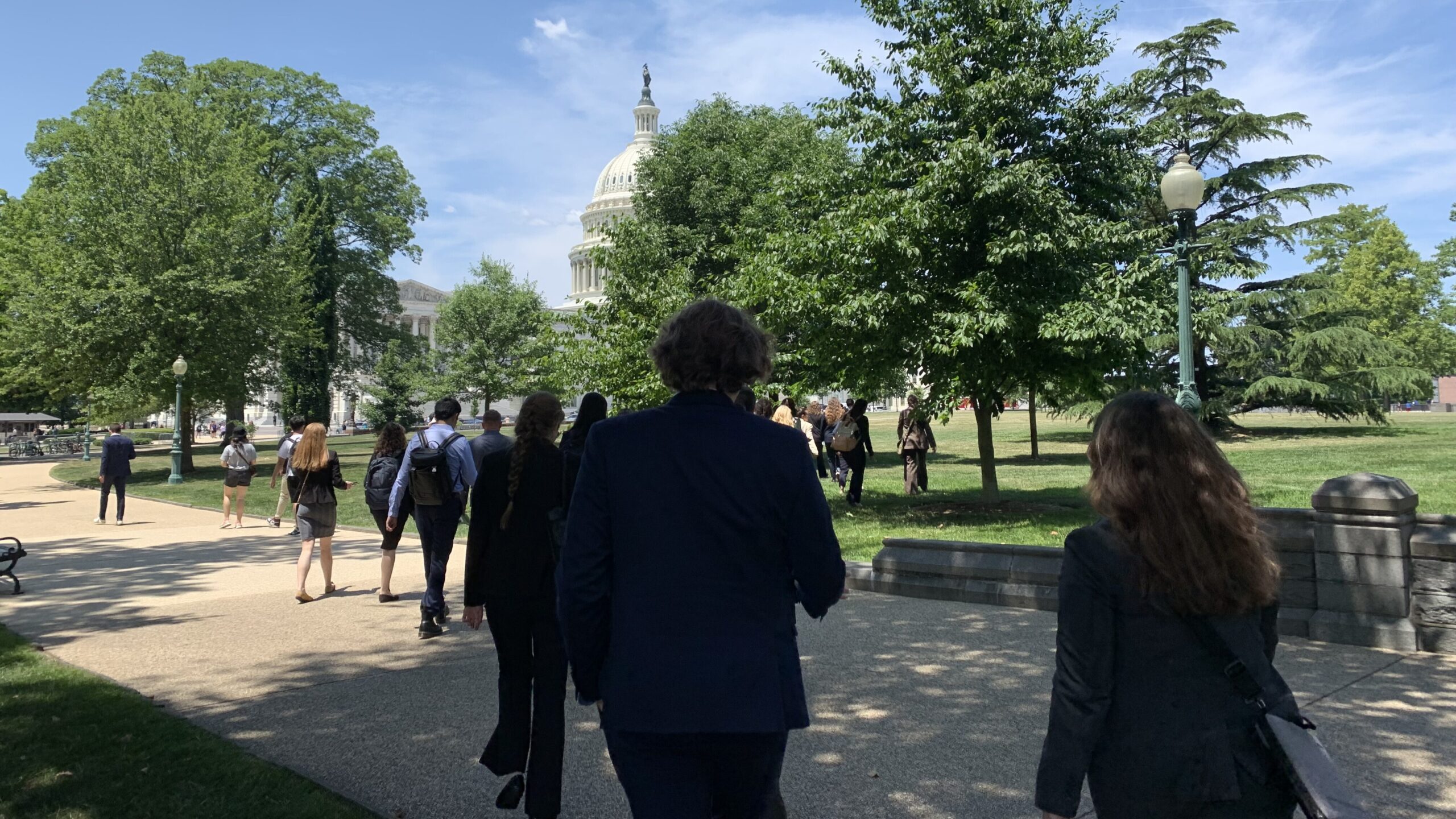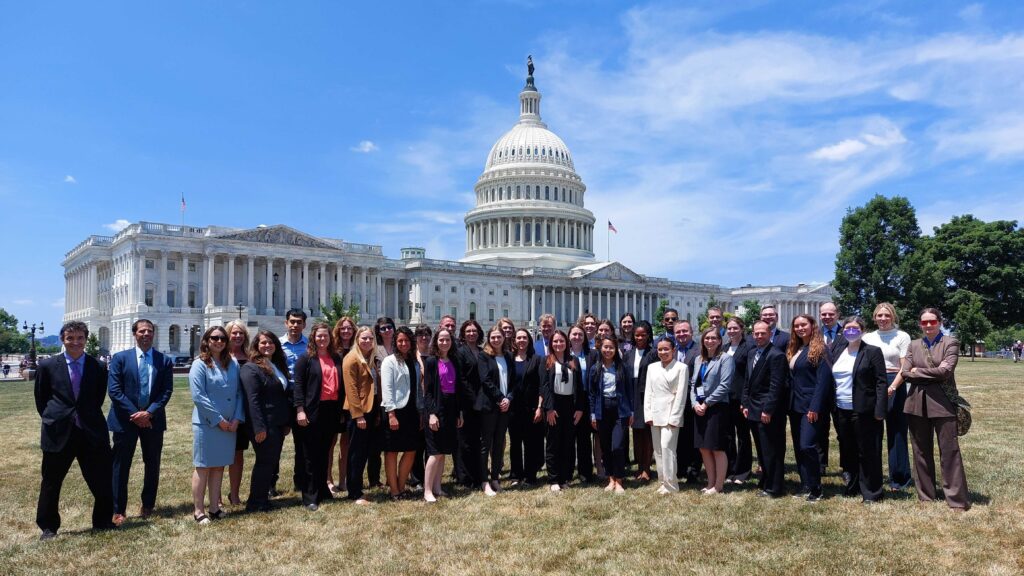A new NOAA oral history archive spotlights lessons from a life in science and policy
William H. “Bill” Hooke, PhD (AMS senior policy fellow emeritus), has both led and thought a great deal about developments in weather, water, climate (WWC) and society at large over more than half a century. He worked for the National Oceanic and Atmospheric Administration (NOAA) and antecedent agencies from 1967 to 2000, including tenures as Deputy Chief Scientist and Acting Chief Scientist of NOAA, as well as Senior Scientist in the Office of the Secretary of Commerce. An honorary AMS member, he has served as a senior AMS policy fellow, associate executive director, and director of the AMS Policy Program. He founded the AMS Summer Policy Colloquium, which he directed for 21 years.
Over the course of many jobs, administrations, and scientific revolutions, Hooke developed a reputation for exceptional leadership and collaboration, for managing crucial initiatives in natural disaster reduction and national policy, and for deep and multidisciplinary insights across scientific and social fields. He has influenced the careers and lives of many people in the WWC enterprise, and won the AMS’s Joanne Simpson Mentorship Award (now the Robert H. and Joanne Simpson Mentorship Award) in 2014. Now, an oral history video series from NOAA captures some thoughts and observations from his long and vibrant career.
In a series of 30 candid conversations, Hooke talks to AMS Policy Colloquium alumna Mona Behl about his life in a family of scientists; his contributions to disaster reduction, the evolution of the WWC Enterprise, and technological innovations; and what it means to be a leader, a scientist, and a person of faith.
Here are a few excerpts from their rich conversations.
On luck:
“My dad was born in Chattanooga … in 1918. … The doctor told my grandmother afterwards, he said, “Mrs. Hooke, that’s the biggest baby I ever delivered whose mother lived.” And in fact [maybe] the reason I’m alive today, is that while the doctor was getting ready to tell my grandfather that he had to choose between my grandmother and my dad, my grandfather was nervously walking around outside the hospital, around the block. By the time he came back in for that consultation, my dad had been born. I’ve reflected a lot … that all of us represent just this accident of history. … We’re all lucky to be here.”
On his childhood and his family’s academic legacy:
“When [my grandfather, who received his PhD from the Sorbonne] came back to the University of North Carolina at Greensboro, he and my grandmother used to have a salon. … People would smoke cigars, and faculty members from the university would come over, and there was just this great conversation and a lot of laughter and so on. As a kid, every time I visited, we’d get to see this scene and participate in it and actually come to like the smell of cigar smoke, although I never smoked. … It was just quite a scene. A spectacular thing to see growing up.”
“[My father, Robert Hooke,] was very interested in problems that were tough to solve. … He thought most of the interesting problems in the world didn’t have solutions. He used to say things like, “Linear problems are all the same. Nonlinear problems are always different.” … The one patent he ever got was for something called Direct Search, which was looking for optima when there was no formula for them.”
“[Getting a PhD in geophysical sciences] was a lack of imagination. Here I was in this tribe of scientists, and it never occurred to me to be anything else. … I woke up with a PhD and thought, ‘Now what?’”
On his early career:
“I never got the job I applied for, and I never turned down one that was offered. … So, I took this job at the Ionospheric Telecommunications Laboratory [in 1967]. … [But when Nixon created NOAA, my boss transferred me to] the Wave Propagation Lab. That was cutting-edge. … [Gordon Little, who ran the lab,] realized that remote sensing was the key to learning about … the atmosphere, the oceans, the solid Earth. … All of these technologies – acoustic sounding, weather radar, Doppler lidar, other techniques, radiometry – were in their infancy, and nothing worked. So, when things started to work, they’d start seeing atmospheric phenomena that nobody had ever seen before … If you had half a brain, you could wander around and you were seeing things that nobody had seen and applying simple ideas to them, and they worked.”
On learning how to manage and lead:
“[Gordon Little] didn’t care much about the Geoacoustics group [at the Wave Propagation Lab] so he put me in charge.] … Well, in our group, we always had a brown bag lunch every day. … The conversation would usually move on, oblivious to whatever I was trying to say. But that lunch [after Little announced the change] … I said something [and] there was this hush that fell over the group. Wow. I realized, from now on, I’m walking in a hall of mirrors. People are only going to show me the side that they think I’m going to like. It was a very important moment for me … One of the things that you learn is, the higher you go … you have to get gentler and gentler and gentler if you really want people to open up to you and for the group to be vibrant the way it should be.”
“If [a leader’s dream is] a small dream, if it’s like, “Hey, we’re going to do this, and a small number of us will get rich.” … It can’t be a shabby dream. People are put off by that. The second thing is it’s got to be a shared dream. … If you don’t share your ideas, they get smaller and smaller and less relevant and really kind of a grotesque version of what they were meant to be. But if you share your ideas, then other people riff on them, and … it actually generates ideas. … People want to be around you. You’re not a sink for thought; you’re a source of it.”
On advice for early career scientists:
“If you’re an early career scientist, you live in a world that encourages you to be anxious and stressed and to feel insecure, maybe even fearful. … [But] the world is hungry for talent. We just have unlimited needs for brain power right now. Brain power is in very short supply, and if you have … something to offer, people are standing in line to harness it and to work with you. It’s just a message that young people need to hear, and they can’t hear it enough.”
On legacy and achievements:
“I have a very dim view of my achievements. … I had the very good fortune to work with just brilliant people. … There’s so much you can do to stifle creativity and innovation, but trying to [instead] stay out of the way of people who are in that business; that means working up the ladder to make that [innovative work] possible for those people. … You need to just be saying thank you and encouraging people day in and day out, hour in and hour out, and you add it up after forty, fifty years, and it has an accumulated effect.”
“I’ve worked with a lot of people who made great contributions to improving weather and climate warnings, but I probably had nothing to do with that myself. … I led efforts where great progress was made. … In particular, a lot of work in small-scale weather, short-term weather, aviation weather, things of that sort. Those were, again, things [that] groups I managed worked on. Made a lot of progress on those things, but it was wonderfully sharp people who did it, and I just kind of went along.”
On civil service:
“The work we’re engaged in is a high calling. I got interested in science because I was good at it, and it was fun. It became serious business, particularly after I got into the hazards work, starting with that Academy panel I was on in 1986, the one that set up the International Decade for Natural Disaster Reduction. … The people were just high-minded people. I saw a lot to admire in the people I was involved with.”
“One piece of advice that I’d give every NOAA employee. … You should take a lot of satisfaction from your role as a civil servant in NOAA and what you’re contributing to society. It’s very easy to see all the things and all the dysfunction and the budget problems … [and] interagency squabbles and the rest of it. … You should just be strong about the value of what you’re doing.”
On the philosophy of science, AI, and innovation:
“Scientists, we might be unique in our difficulty at understanding that we’re not pure. [laughter] We struggle so much to work on the objective part and the experiments in the lab … that we forget that science is a human construct … You have to think a lot more about the human purposes and the human goals and so on. … With artificial intelligence[,] I think we’re all seeing in a vague sort of way, “Wow, this has so much potential for both good and evil.” I don’t think there’s been a moment since the construction of nuclear weapons that people have been [so] apprehensive about the steps we’re now taking. These are steps that have nothing to do with science as we understand it; it has everything to do with humanity. We don’t trust ourselves … to control this science for the benefit and use of life versus those inferior things – fame and power, money and so on – that [Francis] Bacon spoke of.”
“When it comes to science that matters … you want multiple paths to it. You want redundancy. One of the things I fought all my career was this bureaucratic tendency to try to reduce duplication in science, and overlap, and I kept thinking, ‘No. On innovation, you want to be doing as much as you can afford.’”
“AI will probably exacerbate this [current breakdown of social trust] to some extent. … I think we’re in for … a Wild West kind of frontier-like period [in which] wonderful things and horrible things are going to happen at a higher rate of speed than usual. Human beings are going to have a period of trying to deal with that. I think that’s why, to me, it’s getting more and more important that we learn how to be forgiving.”
“Tom [Durham] had written just a stellar disaster preparedness strategy for the State of Tennessee. … Tom had a lot of expertise, and he brought it to bear on this very thoughtful strategy and worked with people to develop it and get started implementing different aspects of it. … That would be the kind of thing that more people could do if aided by artificial intelligence.”
“When I was still living out of Boulder … we had some huge thunderstorms moving rapidly through the Denver area. There was a small echo up in Cheyenne, Wyoming, that didn’t seem worth paying much attention to. Well, it stayed put for six hours … [and] one or two people drowned when the flooding occurred. That’s the kind of thing that an artificial intelligence system might be better at capturing, that kind of alertness and just looking for a detail … that other people might miss. So, I think AI really changes the possibilities for good if we have good intentions and look for ways to harness it. … It’s going to be fun to sort it out. But I think it really changes things.”
On confronting environmental change:
“To get out of the pickle that we’re in with regard to climate change and broader environmental issues … we have to be good as much as we have to understand the science of things. … We’ve got eight billion people playing some version of [game theory] – lack of trust, lack of forgiveness, lack of tolerance. [And] there’s a lot of complacency about all the aggression that we’re visiting on others. … I’ve been very interested in the whole rise of the diversity, equity, inclusion kind [of thing] because it seems to me it’s getting at this … at the level that it really needs to get at it.”
“We are each responsible for fixing it, whatever the problem is. That doesn’t mean changing history; you can’t do that. It is what it is. It means a path forward. … We have to work on the problem all of us together, and that’s eight billion of us. Everybody has something to offer. Everybody has something to regret. It’s our job right now. It’s the 21st-century task. … Suppose you decide that your task in life is to be responsible for the renewal of the world versus your task in life is to document the collapse of the world. Choosing the second one over the first is a poor trade [laughter] in so many ways.”
On his work in natural disaster reduction/resilience:
“The Subcommittee for Natural Disaster Reduction was under this Committee on Environment and Natural Resources. … We felt that our goal was really to try to build US resilience. … It’s really people who were disadvantaged, to begin with, who are hurt most by natural disasters when they occur … I think I told you I’ve always been interested in political science … But it just got to be a much richer thing after that. … I went from feeling excited about what I was doing because it was just so interesting, to feeling each day that I could help make the world a better place.”
“A lot of interest in the government [at the time was on climate change] – this was the Clinton Administration … If you were working on natural hazards, you were struck by [the sense] that the planet really did much of its business through extreme events. These averages that were of so much concern were the averages of extremes of heat and cold, extremes of precipitation and drought. … [Today] we see people putting those two things together.”
“The President looks at a certain number of disaster declarations over the year … But for each of the local officials, it’s life-changing. … the incentives for thinking ahead locally for events like this are just so much stronger than the incentives for a President of the United States to look at these matters. I continue to feel that the best thing to do would be [to] give people at the local level more tools for dealing with this.”
On the AMS Policy Program and Policy Colloquium:
“I was minding my own business. In the year 2000, I was thinking I had about ten or fifteen more years to go in government … I got invited downtown to the DC offices of the American Meteorological Society by Ron McPherson, who was the executive director at the time, and Dick Greenfield, who was standing up this new thing called the AMS Policy Program. … They asked me, ‘Well, when could you start?’ And I said, ‘Two weeks.’ [laughter]”
“I had basically a year to kind of get [the AMS Summer Policy Colloquium] ready and got it started in [2001]. … One of the things I found out pretty early was all the congressional staffers, policy officials in the government, and so on – they were looking for something like this, too, and they were skeptical that maybe the AMS could deliver … But after they came the first time and saw how bright the Colloquium participants were … the speakers just thought, “What a great group. What a great format. All this time for discussion” and so on. Sometimes, they’d come early and hear their colleagues’ lectures or stay late for another colleague’s lecture. That added kind of to the vibe. They’d ask questions as part of the discussion. It was, thanks to the participants, really lively.”
“The Colloquium was a way of showing people that the real world wasn’t operating on the basis of the Navier-Stokes equations, or the rules of radiative transfer, or plasma physics, or whatever – it was working on heuristics, conjecture, power and courage, and trust and faith, and a whole bunch of things on which all those equations are silent. … [As scientists,] we’re not used to being as disciplined in our approach to the policy process as we are to science. This was an effort to overcome that. … I really think the whole thing was a tribute to, again, just the passion that the science leadership of this country, government agencies, and staffers on the Hill had for it and the quality of the participants that were coming in … The people made it all work. … It was just a privilege to be part of it for two decades and to just watch this sweep of intellect, energy, and talent go by.”
On retiring (or not):
“My uncle “retired” in his fifties and moved back to North Carolina. But at the age of eighty-something, he was still getting research grants from DARPA [Defense Advanced Research Projects Agency] to do these non-fusion applications of plasmas. He was part owner of a drugstore on the main street in North Carolina. … He would do his physics there in the diner and kind of go over to the university … He was the inspiration to me. I kind of felt as long as my uncle was still working, who was thirteen years older than I was, I ought to be working, too. Only I did it in a more formal way and I’m just tremendously happy I did. These last twenty years or so of my career were the best by far.”
View the full video series and transcripts at the NOAA Voices Project
View a biography of Bill Hooke
Bill Hooke is the author of the book Living on the Real World: How Thinking and Acting Like Meteorologists Will Help Save the Planet. He runs the Living on the Real World blog, where you can read his continuing contributions about science, society, and this moment on the planet Earth.
About the NOAA Heritage Oral Histories Project
NOAA Heritage Oral History Project aims to document the history and legacy of NOAA through compelling interviews with its leaders. These firsthand accounts provide an invaluable resource that preserves NOAA’s significant contributions to environmental research and management, fostering a deeper understanding of NOAA’s vital role in shaping our understanding of the Earth’s oceans and atmosphere. Learn more here.



